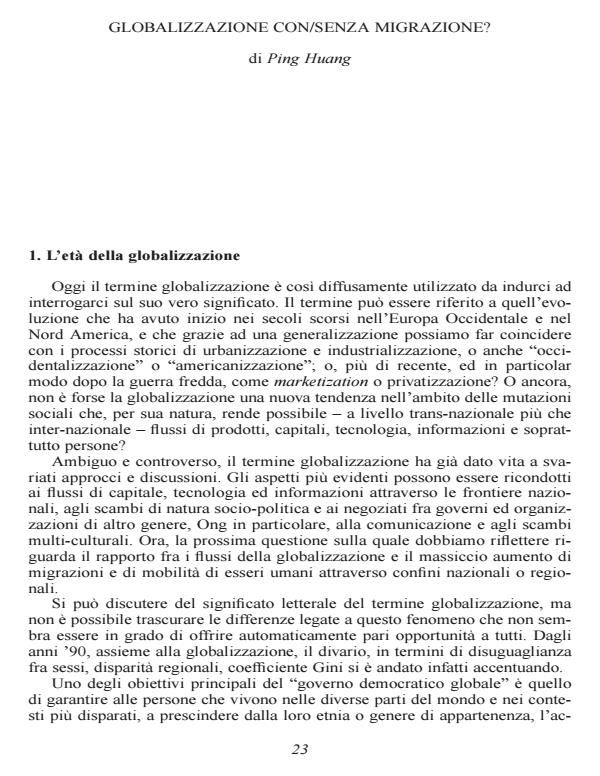Globalizzazione con/senza migrazione?
Journal title SOCIOLOGIA DELLA COMUNICAZIONE
Author/s Ping Huang
Publishing Year 2005 Issue 2005/37
Language Italian Pages 12 P. File size 43 KB
DOI
DOI is like a bar code for intellectual property: to have more infomation
click here
Below, you can see the article first page
If you want to buy this article in PDF format, you can do it, following the instructions to buy download credits

FrancoAngeli is member of Publishers International Linking Association, Inc (PILA), a not-for-profit association which run the CrossRef service enabling links to and from online scholarly content.
The term globalization has to be referred to a new trend of social transformation which enables trans-national flows of products, capital, technology, information, and above all, people. So this paper deals with a study of labour migration in Southeast Asia, in terms of its social and political impacts. For example internal labour migration is protruding in China and India, while in the Philippines, Thailand, Malaysia, Korea and Japan, due to the differences in the size of the countries and population, the trend for internal migration is not evident. Generally speaking, poverty, either caused by natural disasters or by unbalanced policies, is the firstly notable reason that causes migration. Reasons that some certain country or region accepts the immigrants are different. Some countries such as Japan, Korea and Malaysia accept immigrants mainly for worker personnel. Illegal or undocumented migration is a common problem. Concerning the issue of undocumented migration, the Philippines, India, China, Thailand and Malaysia have traditional migration routes that are still active. On the other hand, it is more difficult to enter into Japan and Korea illegally. Undocumented migrants are unwilling to access public services unless it is absolutely necessary for fear of being identified, detained and deported. What’s more, they are discriminated by the locales and the mass media. Overall, both cross-border and internal migration provides benefits to the migrants, the sending countries and the receiving countries thus the general consensus is that all forms of migration will remain circular, temporary or permanent depending on the situation. Thus, the best way to address the issue is to determine innovative measures and policies for the integration of migrants and reintegration of returnees into the local society and to encourage local societies to be more receptive to the presence of migrants.
Ping Huang, Globalizzazione con/senza migrazione? in "SOCIOLOGIA DELLA COMUNICAZIONE " 37/2005, pp , DOI: